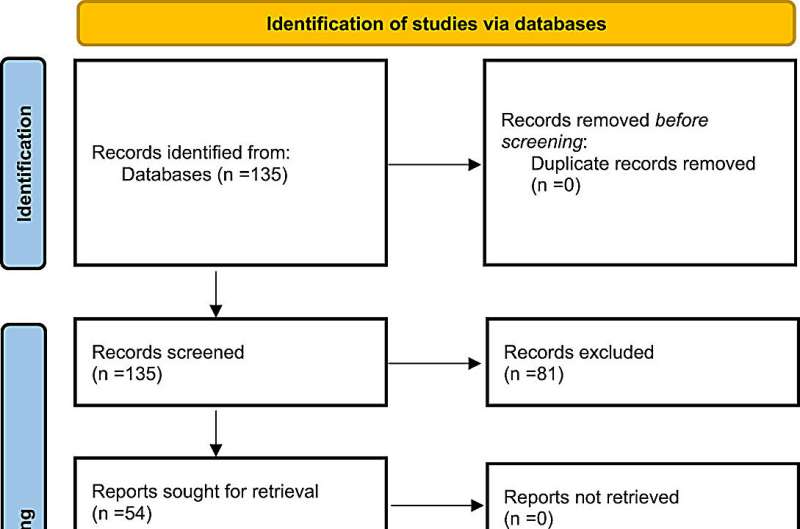This article has been reviewed according to Science X's editorial process and policies. Editors have highlighted the following attributes while ensuring the content's credibility:
fact-checked
trusted source
proofread
AI and machine learning can successfully diagnose polycystic ovary syndrome

Artificial intelligence (AI) and machine learning (ML) can effectively detect and diagnose Polycystic Ovary Syndrome (PCOS), which is the most common hormone disorder among women, typically between ages 15 and 45, according to a new study by the National Institutes of Health. Researchers systematically reviewed published scientific studies that used AI/ML to analyze data to diagnose and classify PCOS and found that AI/ML based programs were able to successfully detect PCOS.
"Given the large burden of under- and mis-diagnosed PCOS in the community and its potentially serious outcomes, we wanted to identify the utility of AI/ML in the identification of patients that may be at risk for PCOS," said Janet Hall, M.D., senior investigator and endocrinologist at the National Institute of Environmental Health Sciences (NIEHS), part of NIH, and a study co-author. "The effectiveness of AI and machine learning in detecting PCOS was even more impressive than we had thought."
PCOS occurs when the ovaries do not work properly, and in many cases, is accompanied by elevated levels of testosterone. The disorder can cause irregular periods, acne, extra facial hair, or hair loss from the head. Women with PCOS are often at an increased risk for developing type 2 diabetes, as well as sleep, psychological, cardiovascular, and other reproductive disorders such as uterine cancer and infertility.
"PCOS can be challenging to diagnose given its overlap with other conditions," said Skand Shekhar, M.D., senior author of the study and assistant research physician and endocrinologist at the NIEHS. "These data reflect the untapped potential of incorporating AI/ML in electronic health records and other clinical settings to improve the diagnosis and care of women with PCOS."
Study authors suggested integrating large population-based studies with electronic health datasets and analyzing common laboratory tests to identify sensitive diagnostic biomarkers that can facilitate the diagnosis of PCOS.
Diagnosis is based on widely accepted standardized criteria that have evolved over the years, but typically includes clinical features (e.g., acne, excess hair growth, and irregular periods) accompanied by laboratory (e.g., high blood testosterone) and radiological findings (e.g., multiple small cysts and increased ovarian volume on ovarian ultrasound). However, because some of the features of PCOS can co-occur with other disorders such as obesity, diabetes, and cardiometabolic disorders, it frequently goes unrecognized.
AI refers to the use of computer-based systems or tools to mimic human intelligence and to help make decisions or predictions. ML is a subdivision of AI focused on learning from previous events and applying this knowledge to future decision-making. AI can process massive amounts of distinct data, such as that derived from electronic health records, making it an ideal aid in the diagnosis of difficult to diagnose disorders like PCOS.
The researchers conducted a systematic review of all peer-reviewed studies published on this topic for the past 25 years (1997-2022) that used AI/ML to detect PCOS. With the help of an experienced NIH librarian, the researchers identified potentially eligible studies. In total, they screened 135 studies and included 31 in this paper. All studies were observational and assessed the use of AI/ML technologies on patient diagnosis. Ultrasound images were included in about half the studies. The average age of the participants in the studies was 29.
Among the 10 studies that used standardized diagnostic criteria to diagnose PCOS, the accuracy of detection ranged from 80-90%.
"Across a range of diagnostic and classification modalities, there was an extremely high performance of AI/ML in detecting PCOS, which is the most important takeaway of our study," said Shekhar.
The authors note that AI/ML based programs have the potential to significantly enhance our capability to identify women with PCOS early, with associated cost savings and a reduced burden of PCOS on patients and on the health system.
Follow-up studies with robust validation and testing practices will allow for the smooth integration of AI/ML for chronic health conditions.
The research is published in Frontiers in Endocrinology.
More information: Application of Machine Learning and Artificial Intelligence in the Diagnosis and Classification of Polycystic Ovarian Syndrome: A Systematic Review., Frontiers in Endocrinology (2023). DOI: 10.3389/fendo.2023.1106625 www.frontiersin.org/articles/1 … do.2023.1106625/full


















